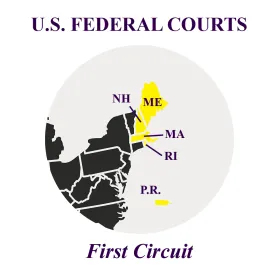On October 5, 2022, in Laufer v. Acheson Hotels LLC, the U.S Court of Appeals for the 1st Circuit reversed a lower court’s dismissal of a suit against Acheson Hotels, LLC, which operates an inn on Maine’s southern coast.
In her complaint, the plaintiff alleges that when she visited the inn’s website, it didn’t identify accessible rooms, provide an option for booking accessible rooms, or give sufficient information about the accessibility features of the inn. She also claims that this information was missing from third-party booking websites. Laufer argued that these informational lapses ran afoul of regulations promulgated under the ADA providing that places of lodging must “[i]dentify and describe accessible features in the hotels and guest rooms offered through its reservations service in enough detail to reasonably permit individuals with disabilities to assess independently whether a given hotel or guest room meets his or her accessibility needs.” 28 C.F.R. § 36.302(e)(1)(ii).
Lower Court Dismissal and Growing Trend of Website Accessibility Suits
The lower court had determined that Laufer’s self-admitted status as a “tester” and not a traveler -- with an intent only to inspect the hotel’s website for ADA compliance -- was fatal to her claim. Laufer could not demonstrate a concrete injury, so the court dismissed her case. She did not plan to visit any physical location but is a serial litigant residing in Florida who has filed hundreds of ADA compliance lawsuits against companies across the country. Laufer’s litigation is part of a broader, nationwide explosion of website accessibility lawsuits as both individual cases and class actions. Plaintiffs have brought these claims in federal court under Title III of the Americans with Disabilities Act (ADA) and, in some cases, under similar state and local laws as well.
These claims have presented serious questions about whether, when, and how website owners must comply with the ADA. There is no legislation that directly sets out the technical requirements for website accessibility. And while the U.S. Department of Justice (DOJ) has stated that “the ADA applies to public accommodations’ websites,” it has not clarified exactly what standards websites must meet to comply with the law. In the absence of clear guidance, courts considering the question have frequently looked to the Web Content Accessibility Guidelines (WCAG), first developed by the World Wide Web Consortium (W3C) in 1999, but most recently updated in 2021.
In 2021, there were 2,895 website accessibility lawsuits filed in federal court. That figure (which does not include state court filings) represents a more than 350% increase over case filing rates just five years ago. During that period, the question of whether a plaintiff can sue a company based solely on alleged accessibility defects on its website has divided circuit courts. And now the First Circuit has waded into the fray.
First Circuit’s Revival of Laufer’s Claims
Dusting off 40-year-old Supreme Court precedent permitting testers for racial discrimination under the Fair Housing Act of 1968 to bring suit, the First Circuit concluded that Laufer demonstrated sufficient injury to have standing to sue. It reasoned, “the Supreme Court has repeatedly said that denial of information to which plaintiffs have a legal right can be a concrete injury in fact.” And even though Acheson altered its website to show the inn has no ADA-compliant lodging, the First Circuit revived Laufer’s suit because there were still plausible claims based on third-party booking websites that may not have been updated.
Key Takeaways for the Hospitality and Other Industries
What does the Laufer ruling mean for the hospitality industry in New England? The risk of website accessibility litigation has dramatically expanded for hospitality companies based in Maine, Massachusetts, New Hampshire, Puerto Rico, and Rhode Island and for lodgings that offer online booking to residents of those states.
Even businesses that do not fit this profile should take heed: companies across all industries, regardless of their location, have been targeted in website accessibility suits, primarily in New York, California, and Florida state and federal courts.
Companies should consult with counsel to evaluate their level of website accessibility litigation risk exposure based on location, industry, current website structure and contents, and, for lodgings, third-party booking arrangements. Armed with this information, businesses and their attorneys can assess current levels of website accessibility, develop plans for ongoing and enhanced compliance, and then take immediate action to adopt first-step improvements that can be implemented immediately. For a comprehensive guide on managing litigation risk for website accessibility, see our previous client guidance.
Website and digital accessibility is a fast-moving area of law. With an increasing number of conflicting decisions and the possibility of new legislation and Supreme Court guidance, we will be closely monitoring this topic and keeping our clients apprised of key developments.





 />i
/>i
